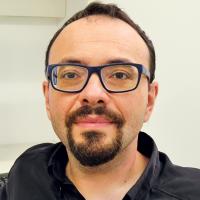
Evgeni Bolotin
Directionality in Genomics and Macroevolution
Mutation rates, variational specificity, and genomic directionality
University of Haifa
Dr. Bolotin develops and executes computational pipelines for the Livnat lab’s ultra-high resolution studies of de novo mutation origination rates as well as applies bioinformatics tools and develops scripts to analyze publicly available datasets in order to conducts a host of studies on the fundamental nature of mutation, including research on structural variation in the human and primate genomes to test predictions of interaction-based evolution. Dr. Bolotin received his undergraduate degree magna cum laude from the Israel Institute of Technology, the Technion, and then continued to a direct PhD track in computational evolutionary genomics with Prof. Ruth Hershberg at the Ruth and Bruce Rappaport Faculty of Medicine at the Technion. Following Ph.D., he joined the Livnat lab as a postdoctoral researcher.

Dorit Fink-Barkai
Directionality in Genomics and Macroevolution
Mutation rates, variational specificity, and genomic directionality
University of Haifa
Dr. Fink Barkai is responsible for executing multistage experimental protocols developed in the Livnat lab to study de novo mutation rates at an ultra-high resolution and produce novel empirical information on the nature of mutation and mutation-rate variation in the human genome, and for coordinating research activities in the lab. She received her undergraduate degree cum laude at the Hebrew University of Jerusalem, her Masters in Cancer Regulation at the Faculty of Biology at the Israel Institute of Technology, the Technion, and her Ph.D. in Cancer Research and Vascular Biology at the Ruth and Bruce Rappaport Faculty of Medicine at the Technion. Prior to joining the Livnat lab, she worked in the Pharmacogenetics laboratory at the Rambam Health Care tertiary hospital in Israel in the development of clinical tests for personalized medicine with an emphasis on chemotherapeutic drugs.

Adi Livnat
Directionality in Genomics and Macroevolution
Mutation rates, variational specificity, and genomic directionality
Subaward Principal Investigator
University of Haifa
Adi Livnat is an Associate Professor in Evolutionary and Environmental Biology and the Institute of Evolution at the University of Haifa in Israel. He is interested in the fundamental question of how evolution happens. He has developed a theoretical account - Interaction-Based Evolution - which argues that the mutations driving adaptive evolution can be neither random nor Lamarckian: they can respond in general not to information that comes directly from the immediate environment (as in Lamarckism) but to information that has accumulated in the germline genome as a result of evolution. Thus, evolution results from co-evolving interactions of mutation-specific probabilities of origination and selection. One empirical prediction of this account is that mutation-specific rates can come to respond to specific selection pressures following multiple generations under selection. The Livnat Lab has developed a variety of novel genomic methods to test these predictions across loci and organisms.

Daniel Melamed
Directionality in Genomics and Macroevolution
Mutation rates, variational specificity, and genomic directionality
University of Haifa
Dr. Melamed is the manager of the Livnat lab. He spearheads the design of novel techniques and their application to the study of mutational and recombinational mechanisms in the Livnat lab and helps to supervise research projects on the fundamental nature of mutation. He earned his undergraduate degree in Biology magna cum laude and his Masters in Cell Research and Immunology summa cum laude at Tel Aviv University, studying the effects of mutations on viral assembly and release from cells in the human immunodeficiency virus-1 (HIV-1). He received his Ph.D. at the Israel Institute of Technology, the Technion, studying mRNA translation regulation. Following Ph.D. and prior to joining the Livnat lab, he was a Howard Hughes Medical Institute (HHMI) Fellow at the University of Washington at Seattle in the lab of Stanley Fields, where he honed his expertise on molecular biological methods development with an emphasis on large-scale sequencing and mutagenesis studies.
